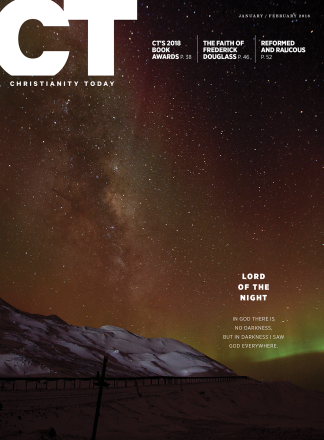I have a plan for my morning—run by the store to pick up a side for dinner and some dish soap, then head to a meeting. So after I brush my teeth and help Jonathan get the kids off to their activities, I get dressed quickly and eat breakfast. I throw on my favorite corduroy coat, hoist my computer bag over my shoulder, and head toward the door. I go to grab the car keys on the entry table that we bought (and painted robin’s egg blue) for the express purpose of having a spot for keys. Next to the jar of dried lavender and stack of mail are two key rings that hold the keys to the car, the house, and our neighbor’s house, as well as a couple others the purpose of which I’ve forgotten (but I keep holding on to them because you never know).
Cue the sound of screeching brakes. The keys aren’t there.
I check the side pocket of my bag, then the pants I wore yesterday, then my bag again. I start to panic a little. I take off my coat. I walk into my kitchen and look on the counter.
I have lost my keys. With them goes all sense of perspective. With them goes my plan; with them goes my cool. These instruments that I use for security and freedom—to lock out bad guys and get where I need to go—have suddenly become a means of imprisonment. I’m stuck.
Where could they be?
I go through my Stages of Searching for Lost Objects:
Stage 1. Logic. I retrace my steps. I look in the places that make sense. I breathe. I try to remain calm and rational: This is not that big of a deal. They’ll turn up.
Stage 2. Self-condemnation. As I make my way through each room, scanning shelves and surfaces, I begin to self-flagellate under my breath: “I’m such an idiot. Where did I put those keys? Why am I such an idiot?”
Stage 3. Vexation. I get frustrated. I curse. Each second that passes leaves me slightly angrier. I switch back and forth between blaming myself and blaming others. Did Jonathan take them? I text him. No help there. God must know where my keys are. Why isn’t he helping here? I’m having a mild theological crisis over a two-inch piece of metal.
Stage 4. Desperation. I start looking everywhere, even places that don’t make sense. I’m rummaging through random drawers and looking under beds, checking the pants pocket that I’ve already checked three times, grumbling.
I check the time. It’s been nine minutes.
Stage 5. Last-ditch. I stop and pray. Okay, breathe. I tell myself that I’m being ridiculous, that I’m overreacting. I quickly ask God for a restoration of perspective. I remember that a Catholic friend once told me to ask Saint Anthony to pray for us when we’ve lost something. So, for good measure, I murmur as I check my sock drawer, “Uh, Saint Anthony, not sure how this works, but if you can hear me, can you please pray for me to find my keys?”
Stage 6. Despair. I give up and plop on the couch. I will never find my keys. The cause is hopeless. I am hopeless. I will be trapped here until the end of time or until we shell out the money to replace them. Outside the window, by my locked car, are naked trees and hopping sparrows, but I will not notice. Everything is worthless. The morning is ruined. Stupid keys. Stupid me. Stupid planet. Stupid universe.
Then, a bit ashamed and guilty about my overreaction, I pull myself together and, beginning at step one, repeat the cycle. Seven minutes later, I find my keys under the couch. I have no idea how they got there. I yelp to no one in particular, “Found them!” Cue the Hallelujah chorus.
I quickly move on. Out the driveway. Skip the grocery store and head straight to the meeting. My lost keys ended up being a hiccup in the day, no big deal, a tiny, forgettable 15 minutes. But it was also the apocalypse.
Apocalypse literally means an unveiling or uncovering. In my anger, grumbling, self-berating, cursing, doubt, and despair, I glimpsed, for a few minutes, how tightly I cling to control and how little control I actually have. And in the absence of control, feeling stuck and stressed, those parts of me that I prefer to keep hidden were momentarily unveiled.
A Tear in the Tape
Sometimes my days run smoothly. Like ticker tape, they hum along, pleasant enough, productive at times—my plans, for the most part, uninterrupted. And then something small happens, the slightest tear in the tape, and the whole thing halts and becomes an unbidden morality tale. The neediness and sinfulness, neurosis and weakness that I try to pretty up and manage through control, ease, and privilege are suddenly on display.
A few weeks ago the dryer, the dishwasher, and the ceiling fan all broke within a few hours. Most of my adult life I have had neither a dryer (we used a clothesline or the laundromat) nor a dishwasher (we did the dishes by hand) nor ceiling fans (we have air conditioning), but when they all broke simultaneously it felt like the universe had me on some kind of hit list. I took it personally.
Small things go wrong. I feel hurried or overwhelmed, burdened by sad news or worried for a friend, and like a rising flood, inch by inch, the collective sadness and frustration mounts and I snap. I yell at my daughters to quiet down. I slam the broken dishwasher door just a bit harder than necessary. I mutter something under my breath. If I were a lioness, I would snarl. As it is, I brood.
These unbidden unveilings in my day are insignificant compared to the immense suffering in our lives and in the broader world. There are people who face profound agony every day: chronic pain, heart-wrenching loss, desperation. In my own life, there have been seasons of deep sorrow. But this is not that. This is not the Valley of the Shadow of Death. This is the roadside ditch of broken things and lost objects, the potholes of gloom and unwanted interruptions.
And yet here is where I find myself on an ordinary day, and here, in my petty anger and irritation, is where the Savior deigns to meet me.
These moments are an opportunity for formation, for sanctification. Underneath these overreactions and aggravations lie true fears. My lost keys reveal my anxiety that I won’t be able to do what I need to do to take care of myself and those around me. They hit on my fear of failure and incompetency. My broken dishwasher uncovers my worries about money—will we have enough to fix it? And it exposes my idolatry of ease, my false hope in comfort and convenience—I just want things to run smoothly.
Today my lost keys provide a moment of revelation, revealing the lostness inside me and my misplaced reliance.
When the day is lovely and sunny and everything is going according to plan, I can look like a pretty good person. But little things gone wrong and interrupted plans reveal who I really am; my cracks show and I see that I am profoundly in need of grace.
But here’s the thing: Pretty good people do not need Jesus. He came for the lost. He came for the broken. In his love for us, he came to usher us into his foundness and wholeness.
Taken from Liturgy of the Ordinary by Tish Harrison Warren. Copyright © 2016 by Lutitia Harrison Warren. Used by permission of InterVarsity Press, P.O. Box 1400, Downers Grove, IL 60515. www.ivpress.com
(Don’t miss our judges’ comments on the Beautiful Orthodoxy Book of the Year, or the rest of the CT Book Awards.)
Have something to say about this topic? Let us know here.











